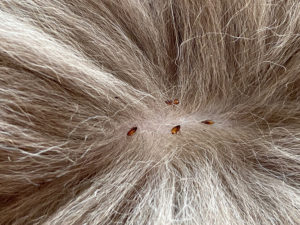Parasites in a dog
Parasites are critters that live in or on your dog's body. We tell you more about the species and symptoms. Are you reading?
All about parasites in a dog
Parasites are nasty critters that many dogs have to deal with. Even if your four-legged friend is healthy and well cared for; parasites are usually no fun. No worries. In most cases, they can be easily remedied. But what exactly is a parasite? What species are there? And is treatment necessary? We update you.
What exactly is a parasite?

A parasite is an organism that feeds on your dog’s blood or food. With this, the critter multiplies. Some parasites have a limited effect on their host, while others cause problems. We distinguish between internal and external parasites.
External parasites are found in the coat or on your dog’s skin. The symptoms vary depending on the species. Your dog often scratches a lot and you may see lumps or spots on the coat. Internal parasites lodge in the body. Thin stools, breathing problems or a thick “worm belly” indicate infection.
External parasites in a dog
The most common external parasites in dogs are fleas and ticks. Dogs become infected with these through their surroundings.
 Fleas are found in your dog’s fur and cause itching in particular. They easily jump onto people or other animals. Therefore, check your dog regularly for fleas and treat him with an anti-flea product if necessary.
Fleas are found in your dog’s fur and cause itching in particular. They easily jump onto people or other animals. Therefore, check your dog regularly for fleas and treat him with an anti-flea product if necessary.- Ticks live in nature and cling to the skin. The parasite then sucks in blood. The little creature can thus transmit dangerous diseases. Therefore, always check your dog for ticks after walking and remove them immediately.
Internal parasites in dogs
Giardia and worms are internal parasites that are common in dogs. Infection usually occurs by eating the parasite. Symptoms depend on the type and degree of infection.
- Worms invade your pet’s intestinal tract and often cause symptoms such as diarrhoea, vomiting and weight loss. Our advice? Worm your dog at least four times a year with a deworming agent.
- Giardia is a gastrointestinal parasite. In general, it is not dangerous. It is, however, highly contagious. The symptoms? Persistent diarrhoea, weight loss, decreased appetite and blood in the stools.
Treating parasites in a dog
With good hygiene, the necessary protective measures and regular checks, you can prevent most problems caused by parasites. Do you notice your dog suffering from the above symptoms or other unusual behaviour? Then it is important to treat your four-legged friend or have it treated. If in doubt, always contact your vet.
Food for dogs with a parasite
Is your dog suffering from annoying symptoms due to a parasite? Our curative food helps. This dietary food helps your dog get well again and supports health. Proven effective and 100% natural.
